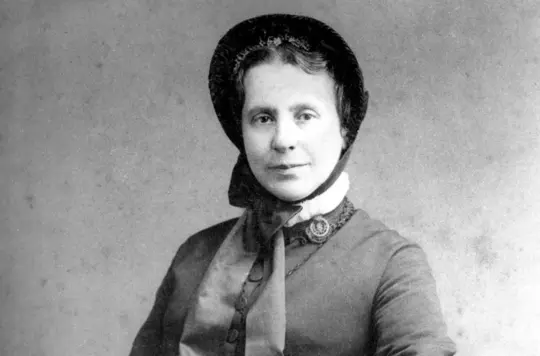29 January 2022
'Redeeming Love': From steamy romance to Christian fiction
Emily Bright interviews Francine Rivers

Author Francine Rivers tells Emily Bright how becoming a Christian prompted her to turn over a new leaf in her career.
Switching from writing steamy romance novels to Christian fiction seems like an unlikely plot twist. But that’s exactly what established US author Francine Rivers did after she became a Christian during a pivotal period in her life.
‘My marriage was collapsing, and we were having trouble,’ she remembers. ‘I needed God, and he came into my life.
‘I grew up going to church, so had the head knowledge but not the heart knowledge. When I went to a new church in my late thirties, I felt like I’d come home. The light just went on. With faith, life makes sense.’
After she found faith, Francine’s career shifted significantly. ‘For a number of years, I wrote historical romances for the general market, but when I became a Christian, I suddenly couldn’t write. I felt God telling me: “You’re saying you want to be my child, but you don’t even know me yet.”
‘So I started reading the Bible every day, and I fell in love with God. When I read the Book of Hosea, it just blew me away – God loves us so much.’
The Bible tells the story of God challenging the prophet Hosea to marry Gomer, a promiscuous woman. The story is an illustration of how God remains faithful to people, forgiving and seeking reconciliation with them repeatedly, despite their own unfaithfulness to him.
Francine explains: ‘I felt like God was saying: “This is the love story that I want you to write. You’ve been writing these other love stories that are counterfeit. I want you to write about the real thing.”’
So she wrote Redeeming Love. The novel, which is set during the Californian gold rush of 1850, reimagines the story of Gomer and Hosea through the character of Angel, a woman trafficked into prostitution as a child, and Michael, the man who loves her unconditionally and seeks to give her a new start. Feeling overwhelmed by his kindness, she runs away. Then, God’s love breaks into her life in a powerful way.
‘Redeeming Love changed the whole course of my writing and altered my outlook on what I was going to do with it,’ says Francine. ‘From then on, I was writing for the Lord – God can use anything, even fiction.’
Since Redeeming Love was published in 1991, it has sold millions of copies worldwide and been translated into 30 languages.
Francine suggests that the book has been popular because ‘everybody’s looking for that unconditional, forever love’ – a love that in reality, she says, they are only truly going to find in Christ.
Redeeming Love has now been made into a film, which was released in US cinemas last weekend. Francine wrote the initial script and then worked alongside director DJ Caruso as he adapted the story.
‘I’m pleased with what they’ve done with it,’ she remarks. ‘It was exciting to be on set to meet the actors and crew and watch how they work.’
Francine continued to write Christian fiction. It felt like the natural thing to do.
‘I had freedom to write whatever I felt God was asking me to write, using it to answer questions in my own faith,’ she says.

‘For instance, my novel The Atonement Child was about the issue of abortion, because I had an abortion in my college years. And I dealt with it for years after I became a born-again Christian. So that book was very personal.’
Francine has another novel out next month, The Lady’s Mine, which tells the story of a 19th-century American woman who inherits a silver mine in a dilapidated town in California and sets about reinventing herself and her community.
Francine explains that writing has strengthened her relationship with God, saying that ‘it has become a tool for me to worship the Lord. While writing, I study the Bible to find out what God is trying to teach me. Life’s not easy, but God has the answers.
‘I try to weave Scripture into my writing naturally. It’s part of my world view, the way I think. I believe that if you immerse yourself in Scripture, it comes out of you in anything you do. Often, God gives you the words in the moment that you need them.’
One way in which Francine engages with Scripture is by reimagining the humanity of real-life heroes of the faith, such as in her Sons of Encouragement and A Lineage of Grace series about the men and women of the Bible respectively.
‘I wrote the Sons of Encouragement series because I realised the importance of strong people behind biblical leaders,’ she says. ‘For instance, I wanted to focus on Aaron, Moses’ brother who is less well known, to highlight how we need to hold each other accountable and that we can’t stand alone.’
As she reflects back on her career to date, she believes that the ultimate aim of her fiction is to offer ‘a bridge back to Scripture, to get people interested in the real work of God’.
She wants people to learn about Jesus. ‘He’s almighty God yet also accessible,’ she says. ‘He understands because he has walked in our world as a human. He is my all in all.’
Interview by

Emily Bright
Staff Writer, War Cry
More from War Cry
All online articles
Women's History Month: Catherine Booth
To mark Women’s History Month, author Cathy Le Feuvre speaks to Emily Bright about Catherine Booth's legacy.

A journalist's view: Celebrities are 'just like the rest of us'
After encountering some of the world’s most famous people, journalist Cole Moreton explains what he has learnt about the value of human connection.

Losing a partner: 'My faith has made the tragic turn of events bearable'
Louise Blyth explains how she and her husband found a new outlook after he developed the cancer that would end his life.

From cabinet minister to prisoner and now prison chaplain
Philip Halcrow interviews Jonathan Aitken and fellow ex-prisoner Edward Smyth about their spiritual survival guide 'Doing Time'.